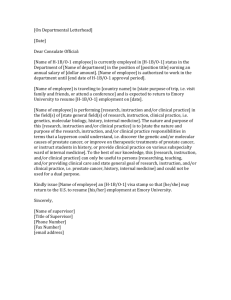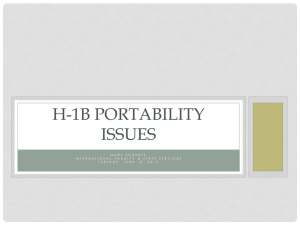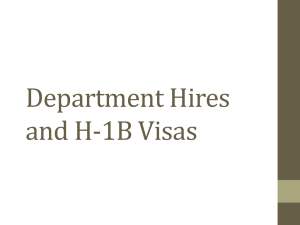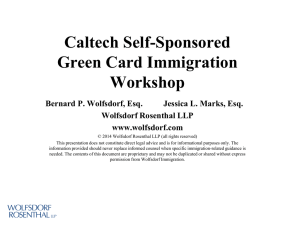Article: Immigration Solutions for Graduate Students
advertisement
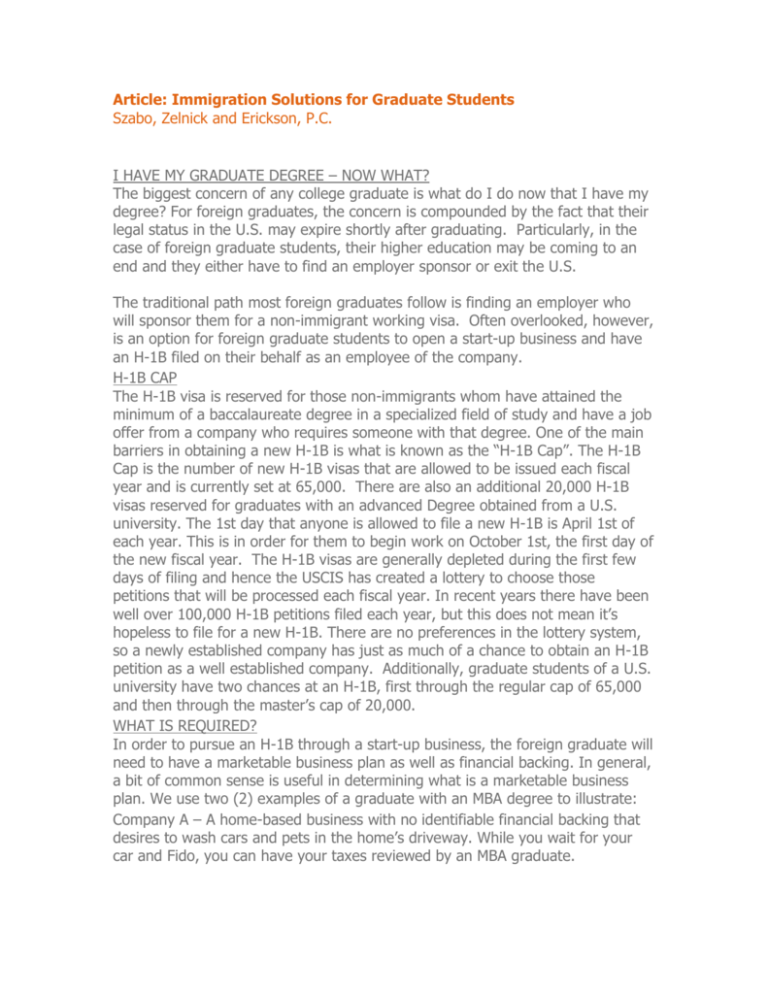
Article: Immigration Solutions for Graduate Students Szabo, Zelnick and Erickson, P.C. I HAVE MY GRADUATE DEGREE – NOW WHAT? The biggest concern of any college graduate is what do I do now that I have my degree? For foreign graduates, the concern is compounded by the fact that their legal status in the U.S. may expire shortly after graduating. Particularly, in the case of foreign graduate students, their higher education may be coming to an end and they either have to find an employer sponsor or exit the U.S. The traditional path most foreign graduates follow is finding an employer who will sponsor them for a non-immigrant working visa. Often overlooked, however, is an option for foreign graduate students to open a start-up business and have an H-1B filed on their behalf as an employee of the company. H-1B CAP The H-1B visa is reserved for those non-immigrants whom have attained the minimum of a baccalaureate degree in a specialized field of study and have a job offer from a company who requires someone with that degree. One of the main barriers in obtaining a new H-1B is what is known as the “H-1B Cap”. The H-1B Cap is the number of new H-1B visas that are allowed to be issued each fiscal year and is currently set at 65,000. There are also an additional 20,000 H-1B visas reserved for graduates with an advanced Degree obtained from a U.S. university. The 1st day that anyone is allowed to file a new H-1B is April 1st of each year. This is in order for them to begin work on October 1st, the first day of the new fiscal year. The H-1B visas are generally depleted during the first few days of filing and hence the USCIS has created a lottery to choose those petitions that will be processed each fiscal year. In recent years there have been well over 100,000 H-1B petitions filed each year, but this does not mean it’s hopeless to file for a new H-1B. There are no preferences in the lottery system, so a newly established company has just as much of a chance to obtain an H-1B petition as a well established company. Additionally, graduate students of a U.S. university have two chances at an H-1B, first through the regular cap of 65,000 and then through the master’s cap of 20,000. WHAT IS REQUIRED? In order to pursue an H-1B through a start-up business, the foreign graduate will need to have a marketable business plan as well as financial backing. In general, a bit of common sense is useful in determining what is a marketable business plan. We use two (2) examples of a graduate with an MBA degree to illustrate: Company A – A home-based business with no identifiable financial backing that desires to wash cars and pets in the home’s driveway. While you wait for your car and Fido, you can have your taxes reviewed by an MBA graduate. Company B – A start-up business with a small office suite in a corporate business building that can provide evidence of promised Venture Capital and desires to provide business management advice and human resources assistance to midsized companies. Although Company A may be unique, it will most likely not be approved as a start-up business for H-1B purposes. Company B has a definite plan and proof of financial backing and the service they will provide will require someone with an MBA degree. Typically, USCIS will want you to prove the following in an H-1B filing: Employer is capable of paying the prevailing wage; Employer has sufficient amount of work; Employer is a real company with proper staff, offices and equipment; If providing consulting services, a letter from an end-client showing the terms of engagement including what the H-1B holder will do and who will supervise them; Evidence to show that the position offered in fact requires the degree that the H-1B holder has. Employers have a better chance of establishing a legitimate business if they can: Demonstrate how they can pay the prevailing wage; Obtain a line of Credit or a Business Loan; A line of credit works similar to a credit card in that if you don’t use it, you don’t pay interest on it. Contact any local bank for more details. Although there is no set number, somewhere around $200,000 in a line of credit is a good number. Please note, merely having money in the bank may not be sufficient; If you have promised Venture Capital of more than $500,000 this should be sufficient; Provide an Office Lease and Pictures of the Office and Equipment; It will be difficult to obtain an H-1B if you are operating the company from a home office. USCIS will typically see this as too small of a business to become a growing employer. how that the company has merit and is a real business. Have a Marketable Business Plan for first 5 years: Remember that as an H-1B employee, the foreign graduate will not be running a cash register or sweeping the floors, but rather filling a specialized position based on the graduate’s degree; Include each anticipated position (and duties) over a 5 year span; Detail the anticipated income/outgo and profit/loss; Include information on financial backers, credit line and any financing as well as how the company plans to re-pay any debt. IS IT WORTH IT? An H-1B visa status may be extended up to six (6) years in total (with a few exceptions for those H-1B holders with a permanent resident filing to lengthen the allowed period of H-1B). The H-1B status is one of the few dual-intent visas, meaning the holder does not have to prove their intent to return to their home country and may file for permanent residency with no “intent” issue. The H-1B visa holder may travel freely in and out of the U.S. as necessary and the dependents of H-1Bs may file for H-4 visa status. The H-4 dependents are not authorized to work in the U.S. but may attend school. WHAT NEXT? If you or someone you know is interested in filing an H-1B petition based on a start-up business or new company, it is highly recommended that you seek the advice of competent immigration counsel. Our office can be reached at 703-4947171 and we would be happy to assist you in this or any other immigration matter. Jerry Erickson is the managing partner of Szabo, Zelnick, & Erickson, P.C. (www.szelaw.com), in Woodbridge, Virginia. He is the senior attorney in the firm’s Business Immigration Section. He has practiced law for over 20 years and represents clients in numerous complex areas of immigration law. He can be reached at jerickson@szelaw.com or (703) 494-7171. The above information is provided for informational purposes only. The information should not be construed as legal advice and does not constitute an engagement of the Szabo, Zelnick & Erickson, P.C. law firm or establish an attorney-client relationship with any of its attorneys. An attorney-client relationship with our firm is only created by signing a written agreement with our firm.
